

Police state. The inhabitants of a police state experience restrictions on their mobility, and on their freedom to express or communicate political or other views, which are subject to police monitoring or enforcement.
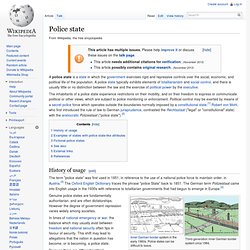
Political control may be exerted by means of a secret police force which operates outside the boundaries normally imposed by a constitutional state.[1] Robert von Mohl, who first introduced the rule of law to German jurisprudence, contrasted the Rechtsstaat ("legal" or "constitutional" state) with the aristocratic Polizeistaat ("police state").[2] History of usage[edit] The term "police state" was first used in 1851, in reference to the use of a national police force to maintain order, in Austria.[3] The Oxford English Dictionary traces the phrase "police State" back to 1851. The German term Polizeistaat came into English usage in the 1930s with reference to totalitarian governments that had begun to emerge in Europe.[4] Third-generation inner German border system circa 1984.
Nineteen Eighty-Four. History and title[edit] A 1947 draft manuscript of the first page of Nineteen Eighty-Four, showing the editorial development.
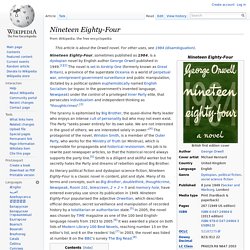
The Last Man in Europe was an early title for the novel but in a letter dated 22 October 1948 to his publisher Fredric Warburg, eight months before publication, Orwell wrote about hesitating between The Last Man in Europe and Nineteen Eighty-Four.[14] Warburg suggested changing the main title to a more commercial one.[15] Copyright status[edit] Military–industrial complex. President Dwight Eisenhower famously warned the U.S. about the "military–industrial complex" in his farewell address.
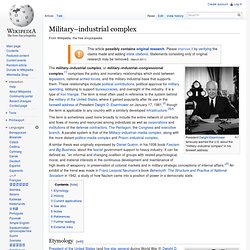
The term is sometimes used more broadly to include the entire network of contracts and flows of money and resources among individuals as well as corporations and institutions of the defense contractors, The Pentagon, the Congress and executive branch. A parallel system is that of the Military–industrial–media complex, along with the more distant politico-media complex and Prison–industrial complex. A similar thesis was originally expressed by Daniel Guérin, in his 1936 book Fascism and Big Business, about the fascist government support to heavy industry. Stop Online Piracy Act.
Proponents of the legislation said it would protect the intellectual-property market and corresponding industry, jobs and revenue, and was necessary to bolster enforcement of copyright laws, especially against foreign-owned and operated websites.
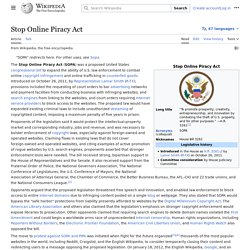
Claiming flaws in present laws that do not cover foreign-owned and operated websites, and citing examples of active promotion of rogue websites by U.S. search engines, proponents asserted that stronger enforcement tools were needed. Opponents claimed that the proposed legislation threatened free speech and innovation, and enabled law enforcement to block access to entire internet domains due to infringing content posted on a single blog or webpage.
They expressed concerns that SOPA would bypass the "safe harbor" protections from liability presently afforded to websites by the Digital Millennium Copyright Act. Transportation Security Administration. The Transportation Security Administration (TSA) is an agency of the U.S.
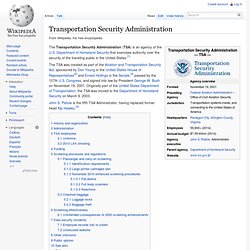
Department of Homeland Security that exercises authority over the security of the traveling public in the United States.[1] The TSA was created as part of the Aviation and Transportation Security Act, sponsored by Don Young in the United States House of Representatives[2] and Ernest Hollings in the Senate,[3] passed by the 107th U.S. Congress, and signed into law by President George W. Bush on November 19, 2001. Federal Emergency Management Agency. The Federal Emergency Management Agency (FEMA) is an agency of the United States Department of Homeland Security, initially created by Presidential Reorganization Plan No. 3 of 1978 and implemented by two Executive Orders on April 1, 1979.[1][4] The agency's primary purpose is to coordinate the response to a disaster that has occurred in the United States and that overwhelms the resources of local and state authorities.
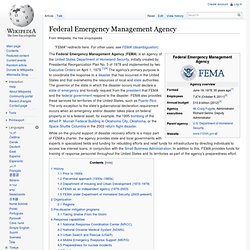
The governor of the state in which the disaster occurs must declare a state of emergency and formally request from the president that FEMA and the federal government respond to the disaster. FEMA also provides these services for territories of the United States, such as Puerto Rico. The only exception to the state's gubernatorial declaration requirement occurs when an emergency and/or disaster takes place on federal property or to a federal asset, for example, the 1995 bombing of the Alfred P.
History[edit] Prior to 1930s[edit] Piecemeal approach (1930s–1960s)[edit] Precrime. Homeland Security moves forward with 'pre-crime' detection. An internal U.S.

Department of Homeland Security document indicates that a controversial program designed to predict whether a person will commit a crime is already being tested on some members of the public voluntarily, CNET has learned. If this sounds a bit like the Tom Cruise movie called "Minority Report," or the CBS drama " Person of Interest ," it is. But where "Minority Report" author Philip K. Dick enlisted psychics to predict crimes, DHS is betting on algorithms: it's building a "prototype screening facility" that it hopes will use factors such as ethnicity, gender, breathing, and heart rate to "detect cues indicative of mal-intent.
" Full body scanner. Backscatter x-ray image of TSA Security Laboratory Director Susan Hallowell A full-body scanner is a device that detects objects on a person's body for security screening purposes, without physically removing clothes or making physical contact.
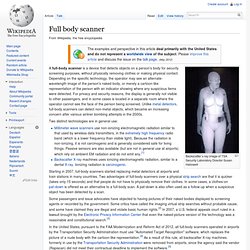
Depending on the specific technology, the operator may see an alternate-wavelength image of the person's naked body, or merely a cartoon-like representation of the person with an indicator showing where any suspicious items were detected. For privacy and security reasons, the display is generally not visible to other passengers, and in some cases is located in a separate room where the operator cannot see the face of the person being screened. Unlike metal detectors, full-body scanners can detect non-metal objects, which became an increasing concern after various airliner bombing attempts in the 2000s.
Two distinct technologies are in general use: History[edit] The first full body security scanner was developed by Dr. Posse Comitatus Act. The Act, as modified in 1981, refers to the Armed Forces of the United States. It does not apply to the National Guard under state authority from acting in a law enforcement capacity within its home state or in an adjacent state if invited by that state's governor. The United States Coast Guard, which operates under the Department of Homeland Security, is also not covered by the Posse Comitatus Act, primarily because the Coast Guard has both a maritime law enforcement mission and a federal regulatory agency mission. History[edit] In return for Southern acquiescence regarding Hayes, Republicans agreed to support the withdrawal of federal troops from the former Confederate states, ending Reconstruction.
Known as the Compromise of 1877, South Carolina, Florida and Louisiana agreed to certify Rutherford B. When the U.S. The original Posse Comitatus Act referred essentially to the United States Army. Legislation[edit] Sec. 15. Central Intelligence Agency. The entrance of the CIA New Headquarters Building (NHB) of the George Bush Center for Intelligence.
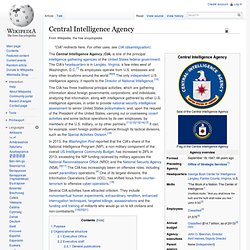
The Central Intelligence Agency (CIA) is one of the principal intelligence-gathering agencies of the United States federal government. The CIA's headquarters is in Langley, Virginia, a few miles west of Washington, D.C.[7] Its employees operate from U.S. embassies and many other locations around the world.[8][9] The only independent U.S. intelligence agency, it reports to the Director of National Intelligence.[10] Several CIA activities have attracted criticism. They include nonconsentual human experiments, extraordinary rendition, enhanced interrogation techniques, targeted killings, assassinations and the funding and training of militants who would go on to kill civilians and non-combatants.[19][20][21] Purpose According to its fiscal 2013 budget, the CIA has five priorities:[4] Organizational structure Executive Office Executive staff General publications. George H. W. Bush. This article is about the 41st U.S. president.
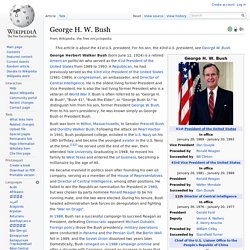
For his son, the 43rd U.S. president, see George W. Bush. Bush was born in Milton, Massachusetts, to Senator Prescott Bush and Dorothy Walker Bush. Prescott Bush. Prescott Sheldon Bush (May 15, 1895 – October 8, 1972) was an American banker and politician. He was a Wall Street executive banker and a United States Senator, representing Connecticut from 1952 until January 1963. He was the father of George H. W. Waco siege. ATF gunwalking scandal. Weapons recovered by Mexican military in Naco, Sonora, Mexico on November 20, 2009. They include weapons bought two weeks earlier by Operation Fast and Furious suspect Uriel Patino, who would buy 723 guns during the operation.[1]